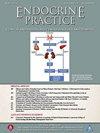The Complex Web of Interferences With Thyroid Function Tests
IF 3.7
3区 医学
Q2 ENDOCRINOLOGY & METABOLISM
引用次数: 0
Abstract
Objective
Thyroid disorders are common. Serum thyroid stimulating hormone is frequently measured and is the single best initial biomarker to diagnose thyroid disease. Automated immunoassays used to evaluate thyroid function are susceptible to interferences that can affect test results and therefore clinical decisions. In this comprehensive review, our aim is to discuss common assay and drug interferences leading to abnormal thyroid function tests.
Methods
Authors conducted a literature review of PubMed to include studies on drug related and laboratory assay interferences leading to primary and secondary thyroid dysfunction in addition to interferences with thyroid hormone replacement and thyroid function tests.
Results
Overall, there are several assay interferences as well as drug interferences leading to primary thyroid dysfunction including iodine-containing drugs such as amiodarone, lithium, immune checkpoint inhibitors and tyrosine kinase inhibitors, drug interferences leading to secondary thyroid dysfunction such as glucocorticoids, and drug interferences affecting thyroid hormone absorption, metabolism, and thyroid binding globulin levels. In addition, assay interferences from biotin, heterophile antibodies, macro-thyrotropin or anti-streptavidin antibodies may occur without underlying thyroid dysfunction, leading to abnormal thyroid function tests.
Conclusion
For appropriate patient management, it is imperative to identify assay interferences when discrepancies between clinical presentation and thyroid function test results are noted.
甲状腺功能检测的复杂干扰网。
目的:甲状腺疾病很常见。血清促甲状腺激素是诊断甲状腺疾病的最佳初始生物标志物。用于评估甲状腺功能的自动免疫测定很容易受到干扰,从而影响检测结果和临床决策。在这篇综述中,我们旨在讨论导致甲状腺功能检测异常的常见检测方法和药物干扰:作者在PubMed上进行了文献综述,除了甲状腺激素替代品和甲状腺功能检测的干扰外,还包括导致原发性和继发性甲状腺功能障碍的药物相关和实验室检测干扰的研究:总体而言,导致原发性甲状腺功能障碍的检测干扰和药物干扰有多种,包括胺碘酮、锂、免疫检查点抑制剂和酪氨酸激酶抑制剂等含碘药物,糖皮质激素等导致继发性甲状腺功能障碍的药物干扰,以及影响甲状腺激素吸收、代谢和甲状腺结合球蛋白水平的药物干扰。此外,在没有潜在甲状腺功能障碍的情况下,生物素、嗜异性抗体、巨TSH或抗链霉亲和素抗体也可能产生测定干扰,导致甲状腺功能检测异常:为了对患者进行适当的管理,当发现临床表现与甲状腺功能检测结果不一致时,必须识别检测干扰。
本文章由计算机程序翻译,如有差异,请以英文原文为准。
求助全文
约1分钟内获得全文
求助全文
来源期刊

Endocrine Practice
ENDOCRINOLOGY & METABOLISM-
CiteScore
7.60
自引率
2.40%
发文量
546
审稿时长
41 days
期刊介绍:
Endocrine Practice (ISSN: 1530-891X), a peer-reviewed journal published twelve times a year, is the official journal of the American Association of Clinical Endocrinologists (AACE). The primary mission of Endocrine Practice is to enhance the health care of patients with endocrine diseases through continuing education of practicing endocrinologists.
 求助内容:
求助内容: 应助结果提醒方式:
应助结果提醒方式:


